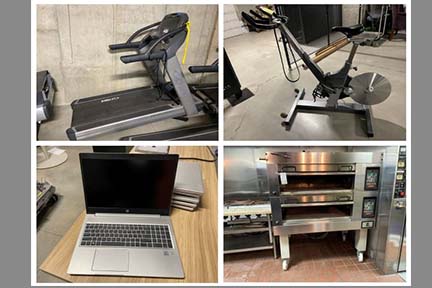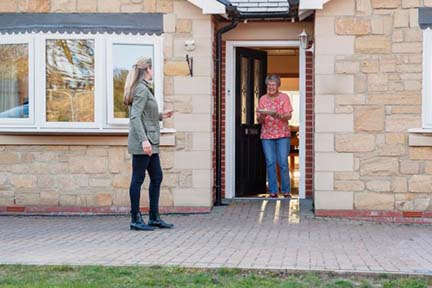
FCC’s One-to-One Consent Rule to Combat Illegal Robocalls
|
|
|

|
|
|

|
|

Biddergy.com
Contact: Ed Ouellette FOR IMMEDIATE RELEASE
Cell 269-317-4803
Email: eouellette@biddergy.com
ORION TOWNSHIP TO AUCTION SURPLUS AND ITEMS FROM THE GREAT
LAKES ATHLETIC CLUB DUE TO RENOVATIONS
Biddergy.com has been contracted to sell various surplus assets via online auction on Tuesday
March 18th! The online auction will consist of items ranging from late model gently used
kitchen equipment, tons of fitness equipment, computers, furniture, and much more! This is a
great opportunity to bid on well maintained equipment. The township purchased the Great
Lakes Athletic Club in 2023 and plans to turn the club into a new community center while still
keeping the fitness component of the building. Featured items include a Doyon double deck
oven, Life Fitness club series treadmills, and various Apple iPads.
All items will be sold online via www.biddergy.com! Visit www.biddergy.com to view all
items!
Pre-Auction Inspection (open to the public)
Tuesday, March 18th 10am-4pm
3800 S Baldwin Road, Lake Orion, MI
Online Auction (bid online, open to the public)
Tuesday, March 18th 8am-8pm
Online at www.biddergy.com
Post-Auction Removal
Thursday, March 20th 10am-4pm
Friday, March 21st 10am-4pm
3800 S Baldwin Road, Lake Orion, MI
Individuals who wish to participate but do not have computer access may contact Biddergy.com
at (866) 260-1611 for more information. Headquartered in Michigan, Biddergy.com has buyers
and sellers from all 50 States and from over 200 Countries! Biddergy.com opened its Las
Vegas warehouse just 4 years ago and conducts online auctions for virtually all industries! In
addition to its auction center locations, Biddergy.com conducts online liquidation auctions
throughout the Country for virtually all industries.
Chicago, IL • Detroit, MI • Kalamazoo, MI • Las Vegas, NV
SOME FEATURED ITEMS UP FOR AUCTION
All items can be viewed by visiting www.biddergy.com. All photos on Biddergy.com may be used for media
purposes.


FOR IMMEDIATE RELEASE March 13, 2025 Contact: press@michigan.gov
Gov. Whitmer Announces 210 New Jobs in Oakland, Eaton, Muskegon Counties LANSING, Mich. – Today, Governor Gretchen Whitmer announced three business expansion projects that will help create 210 new jobs and result in over $56 million in capital investment in Oakland, Eaton and Muskegon Counties. AJG Aerospace provides products for the space, defense and commercial airline industries and has announced their plans to expand their manufacturing capabilities and house their new corporate headquarters in the Township of Independence, Oakland County. Midwest Press and Automation is expanding their footprint in Delta Township, Eaton County to meet growing customer demand. Finally, Forming Technologies, a Muskegon-based thermoformed products manufacturer, is expanding their facility in Muskegon’s Port City Industrial Park to accommodate new business. “Today’s announcements will create 210 good-paying jobs, drive more than $56 million of investment across the state, and build on our leadership in advanced manufacturing,” said Governor Whitmer. “I’m grateful to all three of these companies for betting on Michigan and on Michiganders. We have the economic momentum, the workforce, and the tools to help businesses and workers succeed, and I will work with anyone to create even more jobs and bring even more investment to every region of our state. Let’s help anyone ‘make it’ in Michigan.”
“These investments in Michigan manufacturing, Michigan workers, and Michigan potential are helping us live up to our mission to ensure every Michigander can live up to their full potential,” said Lieutenant Governor, Garlin Gilchrist II. “When Michigan companies grow, prosper, and create jobs in Michigan, we all win. Let’s keep working together to make Michigan the best state to have an idea and build something great.”
“Midwest Press and Automation has long been a cornerstone of homegrown economic development in Eaton County. I applaud the MEDC for recognizing and investing in the immense role Delta Township plays in Michigan’s manufacturing industry,” said state Representative Angela Witwer (D-Delta Township). “I look forward to seeing the great impact this expansion will have for people in my community, including the creation of more quality, family-supporting jobs that will continue to make Delta Township the place to grow roots and build a life.”
“I’m excited to see a homegrown company like Midwest Press and Automation double down on its commitment to Mid-Michigan,” said state Senator Sarah Anthony (D-Lansing). “This is a prime example of how local and state partnerships can stretch our state dollars further, generating accessible, high paying jobs with benefits for all Michiganders.”
“The Muskegon Area has a long and storied history of being on the forefront of manufacturing innovation,” said state Representative Will Snyder (D-Muskegon). “This investment by Forming Technologies, supported by the State, represents only the most recent of these transformational investments. Expansions like this push our community into the future of manufacturing. Development of a high-skilled 21st century workforce is always a top priority of mine, and this investment is just the latest.” “I am delighted with the Michigan Strategic Fund’s decision to support Forming Technologies with a $500,0000 MBDP performance-based grant,” said state Senator Jon Bumstead (R-North Muskegon). “With this support, Forming Technologies will be able to further expand their footprint in West Michigan, with a capital investment of up to $18.76 million, the creation of 70 new jobs and retention of 91 jobs. I’m excited to see the expansion of Forming Technologies add to the growth and momentum of our Muskegon community and the West Michigan region.” “Today’s announcements by AJG Aerospace, Midwest Press and Automation and Forming Technologies are proof points of Team Michigan’s successful execution of the ‘Make it in Michigan’ economic development strategy focusing on People, Places and Projects,” said Quentin L. Messer, Jr., CEO of the Michigan Economic Development Corporation. “We remain grateful that these companies chose to ‘Make It in Michigan.’ We thank Governor Whitmer, the bipartisan legislature and our economic development partners for providing us with the Michigan Business Development Program grant tool to secure these investments in our great state. Work remains; however, we celebrate these three companies growing in Michigan.” AJG Aerospace is a state-of-the-art aerospace startup producing aerospace invar bond tools, aluminum vacuum fixtures, carbon fiber bond tools, carbon fiber flight parts, aluminum flight parts and carbon fiber structural parts. Their clientele includes customers in the space, defense and commercial airline industries. “We appreciate the engagement and support from the Michigan Economic Development Corporation. They worked with AJG Aerospace to create a win/win scenario as we embark on building a world-class aerospace company in Michigan,” said Andrew Greenlee, Chairman of AJG Aerospace. “A key factor in our decision was the talented workforce in Michigan that will be a critical factor in the success of our business. We couldn’t be more excited about the future in Michigan.” The company is announcing their plans to lease and renovate a 120,000-square-foot facility in the Township of Independence in Oakland County. This new plant will function as a manufacturing facility as well as their corporate headquarters, as part of their long-term strategy to produce products for their target industries. “We are all-in on advanced manufacturing in Oakland County and we’re excited to welcome AJG Aerospace to Clarkston,” said Oakland County Executive David Coulter. “This investment in the aerospace industry will help propel Michigan’s and Oakland County’s economy into an exciting future that is boundless.” The investment in the facility is expected to result in capital investment of at least $33,785,373 and create 125 new jobs with the support of the Michigan Strategic Fund through a $1,000,000 Michigan Business Development Program (MBDP) performance-based grant. Two-thirds of the newly created jobs will start above the Regional Median Wage of $23.73. Entry level positions start at $20 per hour plus benefits with training in key elements of the business and the intention of being promoted to a higher wage level over the course of 12-24 months. Average wages are expected to be $34.25. “As part of a continued partnership with the Michigan Economic Development Corporation, we are excited to welcome a state-of-the-art Aerospace startup to Independence Township. This facility will create hundreds of high-paying, professional jobs and strengthen our community’s workforce,” noted Independence Township Supervisor Chuck Phyle II. “The addition of a business like this reflects our commitment to fostering a thriving, high-quality job market in the Township. We are confident that this company will play a pivotal role in driving innovation and long-term economic success in our community.” The expansion of AJG Aerospace follows announcements from Flash Steelworks and Loukus Technologies that build on Michigan’s long-standing leadership in the defense sector with the help and support of the Office of Defense and Aerospace Innovation (ODAI). ODAI supports a defense industry that contributes $30 billion in economic activity for Michigan, with more than 166,000 jobs and nearly 4,000 Michigan businesses serving the defense, defense aerospace, and homeland security industries. Midwest Press and Automation is a solutions-based company servicing the metal forming industry including machine repair, electrical diagnosis and repair, mechanical engineering and welding. The company is integral to the supply chain of many second-tier OEMs including companies in the defense, healthcare, motor laminations, agriculture, building fasteners and food and beverage services industries. The company is announcing the expansion of their footprint in Delta Township to accommodate an additional 27,000 square feet of assembly and machining space to help with growing demand. The expansion is expected to generate a capital investment of approximately $4 million and create 15 new jobs with a starting wage of $32.00 per hour plus benefits, representing nearly $9 more than the Regional Median Wage. This project is being supported by the Michigan Strategic Fund through a $202,500 MBDP performance-based grant, paired with support from Delta Township through an anticipated approval of a real property tax abatement with a State Education Tax abatement from the MEDC. “The Lansing region continues to be a great spot for investment, and for growing companies like Midwest Press with a bright future,” said Bob Trezise, President and CEO of the Lansing Economic Area Partnership (LEAP). “This project marks yet another victory for our mobility manufacturing ecosystem, providing further evidence that the Lansing region is a mobility hot spot now and for the future. Of course, projects like this are only possible because of great partners, especially Delta Township and the MEDC. Congratulations to all!” These state-approved funds will help offset the cost of expanding the company’s existing facility and expand production and its workforce, giving it greater capacity to remain a competitive firm in the industry. For those interested in pursuing a career with Midwest Press and Automation, please fill out an application <HERE.> Forming Technologies, a Muskegon-based heavy gauge thermoformed products manufacturer, has experienced a significant increase in business over the last several years. As a result of the new business, the company is announcing their expansion plans that will lead to the construction of a new building of at least 150,000 square feet in Muskegon’s Port City Industrial Park. This new facility will also serve as the company’s corporate headquarters. “Greater Muskegon Economic Development is excited to see Forming Technologies expanding in the City of Muskegon,” said Greg King, Director of Economic Development for Greater Muskegon Economic Development. “This business expansion reinforces the skilled and dedicated workforce we have here in West Michigan. By choosing to remain and expand in Muskegon County, Forming Technologies exemplifies a commitment to innovation and support for the economic growth of our greater community.” Forming Technologies anticipates the project will result in capital investment of up to $18,766,591 and the creation of 70 new jobs along with the retention of 91 jobs. Of the 70 new jobs, 24 have starting wages between $25 and $42 per hour plus benefits, which is above the Regional Median Wage (RMW) of $21.97 per hour. The remaining jobs have starting wages between $18 and $21 per hour plus benefits. While this is lower than the RMW, the ALICE Wage for Muskegon County is $18.08 per hour, and was considered when the initial incentive offer was offered. The Michigan Strategic Fund has supported this expansion with a $500,000 MBDP performance-based grant. The company was considering South Bend, Indiana, as an alternative site, but with the respect the company has for the talent in the West Michigan region, alongside support from the MSF, the company chose to move forward in Muskegon. Due to the importance of this expansion to the local community, the City of Muskegon anticipates approval of a real property tax abatement in support of the project. In addition, the MEDC also authorized a State Education Tax abatement to be used in conjunction with the locally approved abatement. “The City of Muskegon is thrilled that Forming Technologies has chosen to make this significant investment in our community. Their track record of employing Muskegon area residents and providing jobs that can support our community’s families will continue in this brand new, 200,000-square-foot facility and represents another successful industrial development project in the city,” added Jake Eckholm, Director of Development Services, City of Muskegon. “We are grateful to have such capable partners in Core Commercial Realty, Greater Muskegon Economic Development, and the Michigan Economic Development Corporation that make this type of large project possible.” The company was founded in 2004 in Muskegon with the mission of becoming a leader in heavy gauge thermoformed products. Forming Technologies and AMD Plastics, an unrelated Ohio-based thermoforming manufacturer, were purchased by North Carolina-based Duramax Holdings LLC DBA Otto Environmental Systems (OTTO) in 2022. |

  |
|||

FOR IMMEDIATE RELEASE March 12, 2025 Contact: press@michigan.gov Gov. Whitmer Announces Record PreK Enrollment, Saving Michigan Families $10,000 Per Year Enrollment now open for free, high-quality PreK for All for 2025-2026 school year LANSING, Mich. – Today, Governor Gretchen Whitmer announced that Michigan has achieved record PreK enrollment in the current school year, saving families an estimated $475 million per year. Enrollment in the Great Start Readiness Program (GSRP), the state’s primary PreK program, is up 24% since the Governor announced the PreK for All initiative in 2023. The announcement was made during an event held at Livonia Early Childhood Center. “PreK for All gives kids the strong foundation they need to thrive in kindergarten while also saving families $10,000 a year,” said Governor Whitmer. “This school year, a record number of children are enrolled in no-cost, high-quality PreK programs across the state, saving Michigan $475 million. Today, 56% of Michigan’s four-year-olds are enrolled in free preK, and in this year’s budget, we can build on this momentum to set up more kids for lifelong success and save even more families more money. Let’s get it done.” “As a dad of three, I know just how important it is for all our kids to get a great start so they can build a bright future,” said Lieutenant Governor Gilchrist. “Thanks to the hard work of preK providers across Michigan and our record, bipartisan investments in preK, we have saved families an average of $10,000 each while ensuring every four-year-old has access to the high-quality early education they deserve. Together, let’s keep finding ways to help families succeed in Michigan.” “We know how important early learning experiences are to children’s development and success, which is why MiLEAP is working with partners across the state to expand access to PreK for All,” said Dr. Beverly Walker-Griffea, director of MiLEAP. “PreK not only benefits 4-year-olds, it also benefits our economy as families can work or go to school knowing their children are safe and learning. PreK enrollment is open now for the 2025-26 school year and families can find programs that meet their unique needs at MiPreKforAll.org.” “Our high-quality educators give our youngest learners a strong PreK education, helping children to be successful in kindergarten and beyond,” said Andrea Oquist, Superintendent of Livonia Public Schools. “Livonia Public Schools is dedicated to providing developmentally appropriate activity-based programs to our students in our brand-new state of the art Early Childhood Center. Families in our area interested in learning more should contact us today.” More than 47,500 four-year-olds are enrolled in GSRP programs in the 2024-25 school year, according to preliminary reports to the state from intermediate school districts. Through all PreK for All programs, which includes Head Start, developmental kindergarten and early childhood special education, Michigan is serving 56% of four-year-olds in free high-quality PreK programming. PreK helps ensure children are ready to thrive when they enter kindergarten, and it sets children up for long-term success by providing the foundation they need to be successful in school and work. In addition to the benefits for children and their development, free PreK saves families an estimated $10,000 per year. A recent analysis found that for every dollar spent on PreK for All, it creates $1.72 in total economic benefits for our state. Enrollment in PreK for All is now open for the 2025-26 school year for children who will be 4-years-old by Dec. 1, 2025. PreK for All is open to all families, no matter their income, while prioritizing those who need it most. Families can visit MiPreKforAll.org to find programs near them that meet their unique needs.
|

Press Release FOR IMMEDIATE RELEASE: March 11, 2025 CONTACT: Lynn Sutfin, 517-241-2112, Sutfinl1@michigan.gov Governor Whitmer proclaims March for Meals Month in Michigan LANSING, Mich. – The Michigan Department of Health and Human Services (MDHHS) is joining with the federal Administration for Community Living and senior nutrition service providers in celebrating the 53rd anniversary of the Senior Nutrition Program as part of March for Meals Month. “For more than 50 years, senior nutrition services have helped create healthy, strong communities where all members can flourish, including our older residents,” said Elizabeth Hertel, MDHHS director. “The Senior Nutrition Program ensures we provide nutritional and social supports to those in need. It is often the gateway for referrals to other nutrition and wellness services such as nutrition education and counseling services, health promotion and disease prevention programs, and other home and community-based services.” Since 1972, the national Senior Nutrition Program has supported nutrition services for older adults. Funded by the Older Americans Act, local senior nutrition programs serve as hubs for adults ages 60 and older to access meals and other vital services that strengthen social connections and promote health and well-being. In recognition of the impact of the Senior Nutrition Program, Gov. Gretchen Whitmer has declared this month as March for Meals Month in Michigan. Each year in the U.S., up to half of adults over 65 are at risk of malnutrition and more than 10 million face hunger. In communities throughout Michigan, older adults sometimes lack access to the high-quality, nutritious food they need to remain healthy and independent. According to the Current Population Survey Food Security Supplement conducted by the U.S. Census for the U.S. Department of Agriculture for 2021, 9.8% of older adults in Michigan have only marginal food security, meaning their “households had problems at times, or anxiety about, accessing adequate food.” Another 6% experience low food security, with households reducing “the quality, variety and desirability of their diets,” and 2.7% have very low food security where “at times during the year, eating patterns of one or more household members were disrupted and food intake reduced because the household lacked money and other resources for food.” That means more than 337,000 members of Michigan’s population age 65 and older are not fully food secure. As part of the Senior Nutrition Program network, local Area Agencies on Aging, Commissions on Aging, senior centers and other local organizations help older adults across the state by promoting healthy eating, decreasing social isolation and improving health. These partners also provide connections to home and community-based services, such as home-delivered meals and congregate dining sites that can support independence and overall well-being. In Michigan in fiscal year 2024, 8.7 million meals were provided to nearly 50,000 home-delivered meal recipients, with another 1.5 million meals served to nearly 42,000 older adults through congregate dining sites at more than 450 different locations, including senior centers and senior housing complexes. For more information about programs and services for older adults and how you can support senior nutrition, visit the Behavioral and Physical Health and Aging Services Administration or the Senior Nutrition Program promotion video. |